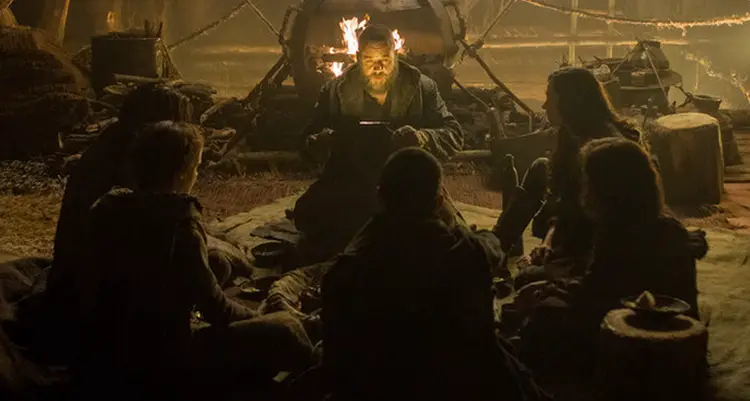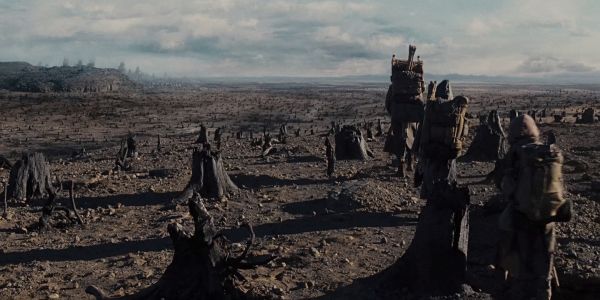NOAH: Director Aronofsky Is The God Of Cinematic Art

Manon de Reeper is the founder and CEO of Film…
Noah is the latest retelling of the centuries old biblical story of Noah and his Ark. In the story, the Creator has had enough of his creation that is humankind and its constant sin, and before he cleanses the world with a flood, he warns Noah of the upcoming apocalypse and commands him to build an Ark and save the innocent: the animal kingdom.
I’m not a Christian but grew up a Christian (Catholic), I was baptized, did the holy communion and went to Christian elementary and high schools, so I know a fair bit of the Bible. While watching Noah last night, I was in a constant state of confusion. It has been at least fifteen years since I last read the story of Noah, and while I always thought it was the most magical of all Bible stories (aside from, perhaps, Jesus walking on water or Moses splitting the Red Sea to cross it) and, as a huge animal friend, it had always been my favorite story; I couldn’t remember it being quite as magical as Aronofsky’s account.
Interestingly, Paramount and Aronofsky got into a bit of a conflict due to the former’s concern considering its religious content and presentation of it. Without Aronofsky’s consent (and to his dismay), they screened three separate cuts of the movie to Christian audiences to see what the response would be – in every case, it was critical. Eventually, they chose Aronofsky’s cut to be shown in cinemas worldwide.
While the movie hasn’t been received well by many Christians, it has already been banned in several Islamic countries, among them Bahrain, Qatar, UAE, Egypt and most recently, in Indonesia – according to them Noah contradicts the teachings of Islam and would “provoke the feelings of believers”.
A Magical Piece of Art
Visually, this movie is just absolutely brilliant, a true gem. Although this movie may not be a direct translation of the original Bible story, Aronofsky did honor to it with its beautiful presentation. Again, the collaboration with Director of Photography Matthew Libatique was fruitful and awe-inspiring. Particularly extraordinary was the recurrent use of silhouette shot scenes (which reminisce of shadow plays), illustrated with the beautiful Icelandic skies, where the movie was (largely) shot:

Moreover, the world is presented as barren and decayed, the few cities and human camps presented are like open wounds in the earth, infested with crawling, filthy humans, like maggots – they all represent hell. Aside from the cities, there is nothing but rocks, sand and dust in sight. But when out of those rocks, large rocky Ent-like creatures arise, you cannot help your jaw from dropping. These creatures, technically fallen angels, are some of the coolest I’ve seen in cinema lately and totally unexpected in this story – one of the biggest creative licenses Aronofsky took with his retelling. Moreover, when Noah magically creates a giant, lush forest in this barren land and we’re bombarded with beautiful shot after beautiful shot, we can’t do anything but bow down to Aronofsky, who is simply the god of cinematic art.
The magical feeling of the movie is strengthened even more so by Clint Mansell’s terrific musical score. Mansell has collaborated with Aronofsky on all his other major films, so it’s no surprise that the music is great – I will always be haunted by Requiem for a Dream‘s score, and in Noah, Mansell adds to the grandeur and significance of the story with his brilliantly composed score. Listen to it here.
A Story of Survival and a Conflicted Man
Noah doesn’t merely depict the story of Noah’s quest to build the ark, it’s much more than that. It tells a story of survival, personal survival as well as the survival of mankind. It also shows how the creatures on the ship survive – surely we’ve all wondered how it’s possible they didn’t just eat each other? But I won’t spoil that.
Most interesting is that Noah shows Noah from a very different side; he’s portrayed as a conflicted man who wants to do right by his Creator, do what’s best for the world, but also what’s best for his family. The way Aronofsky depicts this struggle makes Noah’s biblical righteousness a lot more humane and realistic. To become righteous, Noah has to overcome great hurdles.
All in all, on the technical and creative end, this movie is a true work of art. The acting performances were (mostly) great, Russell Crowe is wholly convincing as Noah, Emma Watson proves that she is well and far beyond Hermione now and has grown up into a very respectable young female actress and Jennifer Connelly shows her acting prowess again, too.
Regardless, there were also some shortcomings.
A Dragging Story and Hopkins the Caricature
One of those shortcomings is the fact this movie is too long. Certain scenes during the movie drag, hurting the overall flow of the narrative. When the flood finally comes, we’re only at 50% of the movie, and in the next 50%, not much happens, even though it’s still gorgeous to watch. Moreover, at a certain point there’s been quite enough hysterical crying; Noah could have done with a little trimming here and there to speed it up. The finale of the movie, which references Noah’s drunken- and nakedness, felt haphazardly tacked on, like an afterthought.
Furthermore, all animals in the movie were CGI and it wasn’t always very convincing, which is unfortunate. However, I don’t think it would have been a very good idea to use real animals for this movie – they definitely wouldn’t have behaved all mashed together in the Ark! Nevertheless, the efforts of the SFX team were very respectable; aside from the animal CGI, all SFX were convincing and impressive.

Finally, although saying it pains me, the Grand Master Anthony Hopkins was a caricature in his role as the grandfather and magician Methuselah – the man who lived for centuries. The character provides the comedic relief in the largely dark movie, but he’s also plain weird. In original Bible texts, he barely has anything to do with Noah aside from being his grandfather, although in non-Bible texts, he helps Noah to convince people to return to godliness. In the movie, however, he was cast into the story rather roughly, ultimately driving the plot forward multiple times in a rather surreal way. However, as it’s still an Aronofsky film, we shouldn’t be too surprised by surrealism.
Surrealism, an Alternate Universe and the Controversy
While you may not expect surrealism from a Biblical retelling, it is what we’ve come to expect from Aronofsky. The surrealism covered almost every element of the story, to the extent where I got the impression we were watching either the story of Noah as it was told in an alternate universe, OR, that the story of Noah took place in an alternate universe itself.
This impression was amplified by the sets and environment, the sky (which shows galaxies and stars even during the day), the total feeling of being lost in space as well as time (there was no way to pinpoint where this story was taking place, nor in what time, as I got the idea they had access to some advanced crafts and know-how), the ability of magic, fallen angels that had turned into rocky giants, et cetera.
A Modern-Day Interpretation
Say what you will about this movie dishonoring the original story; Aronofsky’s Noah is creative, unique and new. Even though many Christians who adhere to the original story will spit on it, others who don’t take the story literally, are not familiar with it at all or see it as a fantastical story to begin with will probably be in awe with it and even love it. It’s a modern-day interpretation of the classic story, one that befits the current trends and fascination with fantasy and science fiction.

Certainly, it’s controversial, but on the other hand, it still wields the same moralistic messages as the original story does. Does the execution and presentation matter, then, if the message people take away from this movie is still similar to the original in that it tells you to respect your surroundings and fellow human beings? That we should not turn our world in a wasteland because of our greed and desire for expansion? In my opinion, it does not.
Conclusion
Even though the story drags at times, Hopkins’ character was a caricature and the animal CGI lacked, Noah is an impressive, ambitious movie that I would recommend every fan of cinema to watch, even just for the divine piece of art it is.
The movie shows a different side of the story of Noah and focuses more on the actual survival of Noah, his family and mankind, and with its added layers of fantasy and surrealism, is a great watch. It’s a unique and creative retelling of a classic story has fascinated us for as long as the Bible exists, and will continue to fascinate us for as long as we exist.
Are you going to see Noah? Sound off in the comments, we love to chat!
If you enjoyed this review, please share it with your buddies on the social networks – it would be very much appreciated!
Does content like this matter to you?
Become a Member and support film journalism. Unlock access to all of Film Inquiry`s great articles. Join a community of like-minded readers who are passionate about cinema - get access to our private members Network, give back to independent filmmakers, and more.
Manon de Reeper is the founder and CEO of Film Inquiry, and a screenwriter/producer. Her directorial debut, a horror short film, is forthcoming in 2021.













